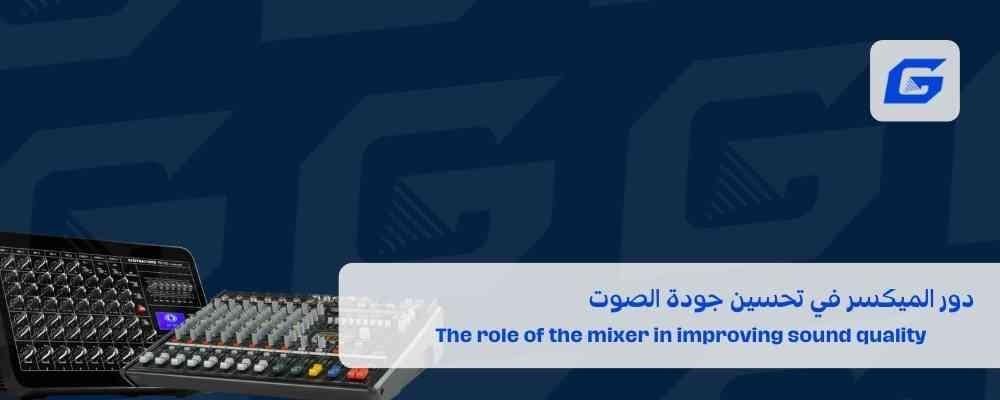An audio mixer is one of the essential tools in any professional audio system. A mixer is used to improve sound quality by adjusting different audio levels and affecting frequencies. Whether you are working in audio production , live music , or major events , the role of a mixer in improving sound quality cannot be ignored. In this article, we will discuss how a mixer can positively impact audio performance and how to use it to get the best results.
What is an audio mixer?
An audio mixer is a device that mixes and organizes audio signals coming from different sources, such as microphones , musical instruments , or other electronic devices. A mixer typically includes a set of inputs and knobs that allow the user to precisely adjust the volume , frequencies , and effects .
Types of nuts:
- Analog mixers:
- It relies on mechanical components and analog circuits to enhance the sound.
- Digital mixers:
- Digital technologies are used to process sound, allowing for more control over effects and fine settings.
How does a mixer help improve sound quality?
1. Adjust the sound levels (Gain and Volume)
One of the first functions that a mixer provides is volume control , allowing the user to adjust the sound strength of each audio source individually.
- Improve balance: Using the mixer, different volume levels can be perfectly adjusted so that the sounds are balanced and do not interfere with each other. For example, you can reduce the sound of the instruments and increase the sound of the vocals or vice versa, ensuring the clarity of the sound in the final mix.
2. Equalization
The mixer allows the user to adjust the audio frequencies (bass, mid, treble) to suit the sound requirements.
- Low frequencies (bass) can enhance deep sound, while high frequencies can improve sound clarity .
- If there is unwanted noise or distortion in the low or high frequencies, it can be reduced to ensure clear sound.
3. Applying sound effects
Modern mixers include audio effects like reverb or EQ that can add depth and vibrancy to the sound.
- Dry sound can be improved by adding some effects that make the sound richer and more realistic.
- In addition to the audio filter that helps remove unwanted frequencies.
4. Voice routing
The mixer can route sound to multiple speakers or sound systems in an organized manner, ensuring that the sound is evenly distributed throughout the space.
- This helps reduce interference and ensures that the sound covers all corners of the room.
- Output control can be useful in theaters or concerts to direct sound to specific areas within the space.
The role of the mixer in different types of audio systems
1. At parties and major events
- At parties or large events , where more than one sound source is being handled at the same time, a mixer is the essential tool for balancing the sound.
- A large number of microphones or portable audio devices can be controlled , ensuring that the sound remains clear and understandable in different locations.
2. In recording and audio production studios
- In recording studios , a mixer is used to precisely adjust levels during recording and editing .
- Digital mixers allow the ability to monitor and enhance the audio before combining it with other elements such as sound effects or background music .
3. In theaters and sound systems for special events.
- In theaters, operators can adjust audio in real time using a mixer to ensure clear sound between the live performer and the audience.
- Live sound can be greatly enhanced with advanced mixers that manage sound in large environments.
How to choose the right mixer?
1. Size and number of channels
Choosing a mixer depends on the number of channels required. If you will be dealing with more than one sound source, such as at concerts or recording studios, you will need a mixer with a larger number of channels .
2. Mixer type (analog or digital)
- Analog mixers are the perfect choice if you need simple, easy-to-use tools.
- Digital mixers offer more precision and control over effects and sound settings, but they can be more complex.
3. Additional effects and supports
Look for a mixer that offers custom settings and sound effects like reverb or equalizer , or even multiple inputs and outputs to effectively mix the sound of microphones and instruments together.
conclusion
An audio mixer is an essential component of any professional audio system, giving you the ability to improve sound quality by adjusting frequencies, adjusting audio levels, and adding necessary effects. With the right mixer, you can ensure that the sound is distributed evenly , which contributes to improving the audio experience for the audience at concerts, events, or even in studios. There is no doubt that advanced mixers play a crucial role in providing a great audio experience, whether in large theaters or in professional audio studios.
Post Cover Description
Cover showing a sound mixer with a professional controlling the sound settings in a sound studio or during a live event, with the title "The role of the mixer in improving sound quality".

